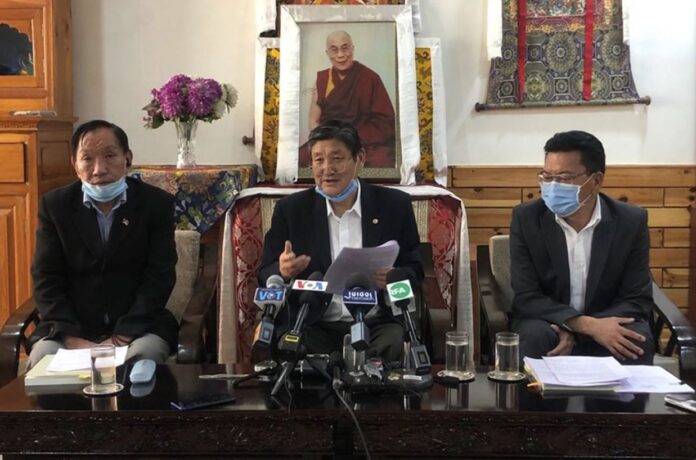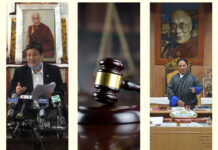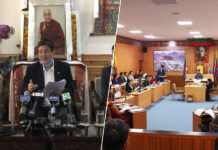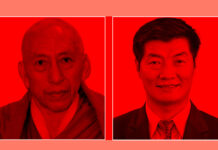
Lawyer Tenzin Jungnay* presents a legal analysis of the Tibetan Parliament in Exile’s Mar 2021 decision to dismiss the entire bench of the Tibetan Supreme Justice Commission to find the latter patently wrong on every bit of the justifications it has provided to assert its claims.
(TibetanReview.net, Apr08’21)
In the morning of the 25th of March 2021 a Gordian knot that was tied by our Parliament in Exile and institutions put the Tibetan diaspora in a state of shock so much so that the community which never paid much heed to the TPiE (Tibetan Parliament in Exile) election – as it used to be overshadowed by the Sikyong Election which is conducted simultaneously – is now proactively engaging in discussions as to which Chitue (Tibetan Parliamentarian) candidate is more suited in their opinion and which one should never get elected/re-elected. But before that, I want each one of us to ask ourselves, whether we really have the motivation to bring about a change. Or has our will and self-respect been crushed under years of staying dormant in foreign country that we have lost our sense of pride and self-reliance? I am saying this because only a certain section of people is questioning this contentious impeachment openly and some puzzled souls have no idea that something like this has happened. Whatever may be the reason, I feel duty-bound to reflect on the incident and it is my firm belief that we should decide this one on our own. Therefore, to help you acquaint with the whole process, we will discuss at length the provisions of the Charter and what all has transpired in the present case so that you can see for yourself what is right and what went wrong.
Firstly, let’s address the major knot in this whole issue, that is, whether the Tibetan Supreme Justice Commission (TSJC) overstepped its boundaries or not because this very doubt led to the present crisis. So let’s read what the law says because the Speaker of the house before initiating the impeachment process during his address to the assembly mentioned about Clause 1 of Article 58 at around 10:04 AM1 and as per him, this Article (Art.) puts them or their workings as Chitue outside the purview of TSJC. Article 58 (1) states:
The Tibetan Justice Commission shall not question the validity of any proceedings or whether any decisions arrived at in the Tibetan Parliament are in conformity with the relevant rules of the PARLIAMENT.
It seems that people have read this article as a sort of immunity given to the TPiE members. But after extensive reading, one can notice key words like “proceedings” and “rules of the parliament.” Now, questioning the validity in the current case will only come if there had been a proceeding to begin with and this rule bars TSJC from checking whether the proceedings or decisions made were in conformity with the parliamentary rules. But it never stops the TSJC from enforcing Charter of Tibetans in Exile on them and from mandating them to at least hold a proceeding as ordered under Article 40. This reminded me of recent information released by a journal on the side effects after Covid vaccination has been administered. It read that the vaccinated person may experience a “Misguided feeling of Immortality”. The interpretation that the TSJC does not have jurisdiction over TPiE even in matters of enforcing Charter seems to be similar. But, like all Tibetans, our Chitue are also citizens of Tibet and thus equal before the law and have to adhere to the Charter like anyone else as enshrined in Art. 9. The speaker also mentioned Clause 2 of Art. 58 which reads as follows:
With regard to the exercise of powers conferred under this Charter for the purposes of drafting procedural or substantive rules, no member of the Tibetan Parliament shall be subject to the jurisdiction of any Tibetan Justice Commission.
In this clause also the judicial exercise is only restricted to all matters pertaining to the drafting of procedural or substantive rules only. Nowhere is it even hinted that the TPiE has immunity if they breach any rules of the Constitution.
Having that doubt addressed, it’s time to untie the last loop of the Knot because once that is done I feel other issues will sort themselves out. Before moving forward, I wish to inform those who don’t have a law background, that the term “Article” is always used to denote a provision in the Constitution, which in our case is The Charter of Tibetans in Exile, while “Sections” are the provisions of rules and procedures that the TSJC is authorized under Article 67 to formulate. Now that you know the basics, let me introduce you to the fire test provided in the Charter i.e Article 5(1) which states:
“Any laws, executive orders and regulations that are in violation of any provision of this Charter shall be invalid”
This means that any step taken by Govt., any direction given by any authority, any rule made by parliament etc. if found incompatible with any Article of the Charter will be deemed void ab initio, meaning ineffective and invalid right from inception. Keep this in mind because it will be relevant later on. Now, simply come down to the Article 63(4) on which the assembly heavily relied on while removing the Justice Commissioners, namely Chief Justice Commissioner Sonam Norbu, Justice Commissioner Karma Damdul and JC Tenzin Lungtok with two thirds majority by secret voting in the assembly. The Article says:
“Unless removed from office by a majority vote of at least two-thirds of the total strength of Tibetan Parliament by a resolution introduced for the purpose of the impeachment of the Chief Justice Commissioner or, as the case may be, any of the two other Justice Commissioners; a Chief Justice Commissioner shall serve for a term of FIVE years or until he or she attains the age of 65, whichever is earlier. The other two Justice Commissioners shall continue to remain in office until they attain the age of 65.”
Here everything checks out with the action taken by the TPiE, except for one little detail which is the mention of the word “Resolution”. Thus, this Article cannot be read in isolation whereas it has to be clubbed with Art. 54 because by definition as per the Rajya Sabha website “Motions and resolutions are procedural devices to raise a discussion in the House on a matter of general public interest”.2 This means that before initiating Article 63(4) i.e. the voting process, the parliament has to satisfy the clause of a “Resolution” being passed in the parliament, meaning a full-fledged discussion has to be ensued in the assembly. And now, as we have mentioned, the term “resolution” which means discussion, it becomes imperative that Art. 63(4) be read along with Art. 54 which dictates that:
“No discussion or debate shall be held in the Tibetan Parliament with respect to the removal or conduct of the Chief Justice Commissioner or any of the other two Justice Commissioners of the Tibetan Supreme Justice Commission except after a committee constituted by the Tibetan Parliament for the purpose had submitted its enquiry report thereon.”
This is the part where we will explore the question of law and question of fact along with procedural inadequacies because in the morning of 25th March 2021 both the Speakers put forth the resolution in parliament for the removal of the members of the TSJC. However, as seen above, Art. 54 clearly restricts TPiE from holding discussion or debate until a committee specially constituted by the Tibetan Parliament for the purpose of removal of Justice Commissioner/s has submitted its enquiry report. Therefore the followings questions of fact arise:
a) When was this committee formed and who all were in that committee?
b) Where is their enquiry report, and, most importantly, what were its exact contents and will all these details be made available to the general public, Ever?
c) Whether any discussion took place on the report, if any before the resolution was passed by the parliament.
As per my enquiry, one of the Chitue had no knowledge regarding the formation of such a committee and I encourage you to please do the same and contact your respective parliamentarians and ask if the committee was formed by the Tibetan Parliament in Exile or not because it is highly likely that this precondition of impeachment was breached. Although some are claiming that this committee was duly formed, the question is why one of the sitting Parliamentarians has no idea about it. Thus, even one of the Chitue not knowing about the committee shows the impeachment process happened in complete disarray and requires a special enquiry on the whole issue.
Once it is determined that there was a procedural lapse then the fire test under Art. 5, as I have mentioned above, will render the whole process Null and Void, meaning ineffective to the point that the Chief Justices might get reinstated, consequently untying the final knot. One of the issues I find intriguing is, why couldn’t the TPiE hold its session on due time as required under Article 40, which states:
“The Parliamentary secretariat shall notify each member of the Tibetan parliament whenever a regular session of the Tibetan parliament is to be held. The dates of such a Parliamentary session, the duration thereof, and the venue should be determined collectively by the speaker in consultation with the standing committee of the Tibetan parliament. However, it must be ensured that each regular session of the Tibetan parliament begins within 6 months from the date of the dispersal of the previous session.
Now as the venue is clearly not defined, I believe that the TPiE could’ve used this as an opportunity to hold the meetings online for the first time and declare the venue as any suitable video conferencing platform. Or they could’ve held the parliamentary proceeding in the humongous auditorium in which the 60th Anniversary of the Tibetan Democracy Day 2020 was celebrated on the 2nd of September 2020.3 It was with officials of the Tibetan Govt. in Exile. A few TPiE members were also present. The same could also be found on TibetTV’s YouTube Channel. Now, surprisingly enough, the Tibetan Govt. in Exile could arrange a whole fanfare in the middle of a “pandemic” but not a simple gathering of 46 leaders. Logic dictates that if people are attending their classes and completing their college degree after using virtual learning; companies are fully adapting to work from home technique while still being able to sustain their businesses; and, moreover, all the governments in the world have been functioning throughout the pandemic, using these common technological tools, why the TPiE alone was unable to do the same. Besides, expecting a little diligence on their part and holding the assembly online is not too much to ask for. After all, no one was demanding that the TPiE to undertake something that was unheard of.
Personally, I believe that our Chitue are all highly learned, and probably have been misguided while dealing in this particular matter. But that doesn’t mean they are always wrong. But this incident proves that they are not always correct in their actions either. Thus as Tibetans we should know the difference between respect and unconditional loyalty because the former motivates one to do good and the latter enables one to trample over others to render them more equal than others. The question is, what kind of people you want to see as elected members of our society.
Likewise, there comes a time when people have to take up matters in their hands and bring about a revolution which defines a course of action that the people want, not what the bourgeois want them to believe that they should have. It’s just like an elephant not knowing that it can very easily break the chains it is tied with if it wants to.
A Gordian knot is an intricate problem which cannot be solved unless a bold action is taken and I believe only a bold action by the Tibetan people will solve this Constitutional crisis and Judicial uncertainty. Therefore, please remember to keep questioning the authorities. Lord Buddha himself taught us to even question his own teachings. And being his disciples, it is our religious duty to question the authorities.
—
* Mr Tenzin Jungnay is a law graduate from National Law University, Jodhpur, and a member of the Bar Association of India. He is presently preparing for an overseas LL.M. enrolment.
Endnote:
1. https://youtu.be/D6nnaJBmZLI
2. https://rajyasabha.nic.in/rsnew/practice_procedure/book7.asp
3. https://youtu.be/NKmWul-KLR4





